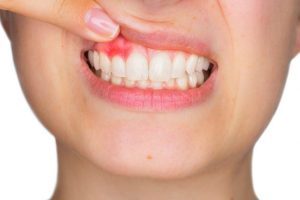
Everyone would prefer to have healthy gums. They look better and help you keep your teeth. Also, they support the health of other organs and systems in the body, including your heart. The leading cause of gingival recession (receding gums) is the presence of harmful bacteria that live at and below the gum line. Therefore, an excellent oral hygiene routine of twice-yearly professional cleanings, brushing twice a day, and flossing daily is your best defense.
Receding gums accompanied by inflammation or infection, known as gingivitis or periodontitis, also can lead to other problems. One of the most critical is the deterioration of the underlying jawbone that supports your teeth. If bone loss around tooth roots becomes advanced, deep cleaning with scaling and root planing may be necessary. During this cleaning, a dentist will pull back the gums and scale the pockets where bacteria are present until the tooth surface is smooth, and there are no pockets left for the bacteria to accumulate.
How to Tell if Your Gums are Healthy
Healthy gums are dark red, but when they recede, pink tissue at the roots of the teeth is exposed. The expression long in the tooth, meaning having reached old age, refers to the gingival recession. Many times, our teeth do appear longer as we age because of receding gums, often caused by bacteria and gum disease. Good oral hygiene is the key to slowing gum recession, but it is essential to do it correctly. For example, brushing teeth too hard can cause gums to recede further. As a result, it’s often a good idea to ask your dental hygienist for a refresher about best practices for brushing and flossing. Even adults can benefit from occasional reminders about what works best.
Whether You Have One Missing Tooth or Several Missing Teeth, Restore Your Smile Today!
Call us with any questions or to make an appointment.
It’s also important to know that it’s not normal to see blood when you brush. If your gums bleed when you brush, it’s likely you already may have some form of gingivitis or periodontitis. It’s wise to see your dentist — and also entirely appropriate to self refer to a periodontist. Periodontists are dental specialists with specialized skills in diagnosing and treating gum disease. At Farber Center, our periodontists not only have advanced training in treating gum disease but also have newer treatments. For example, new laser-assisted methods to treat and resolve gum disease are more effective, less invasive, and more comfortable for you.

Can Receding Gums Harm My Teeth?
Receding gums are an oral health concern when they get to the point where tooth roots are exposed. It leads to a higher risk of decay, infection, and loss. Therefore, if you suspect your gums are receding, or a dental professional has brought it up to you, it’s time to seek treatment. The good news is that starting treatment at an early stage can stop or reverse the process of gum recession. If your gum recession is already more advanced and causing symptoms, various options are available. The symptoms you may notice include tooth sensitivity, pain, or infection, often accompanied by swelling.
Receding gums is a common condition, but people often do not realize their gums are receding until a late stage in the process. As a result, it’s a wise idea to watch closely and ask your dentist or hygienist during routine cleanings and check-ups. Another cause of gum loss is tooth grinding. Grinding your teeth can misalign them and cause tiny spaces to form where plaque and tartar can build up and make harmful bacteria more difficult to remove. If you are grinding or clenching your teeth, which likely is caused unconsciously, asking to be fitted for a nightguard also can help. It will provide a cushion between teeth and lessen the damage caused by grinding.
For an Exam or More Information, See a Professional
Left untreated receding gums and associated periodontal diseases may lead to loose teeth and tooth loss. Because of the potential seriousness of the condition, don’t hesitate if you’re wondering about your gums. In addition to the recession, chronic gum disease also causes bad breath and painful inflammation. Receding gums are an issue everyone has to deal with. Practicing good oral hygiene is an essential factor in slowing and preventing gum loss, but there is always the possibility that you will develop gum loss only due to age. No matter what the symptoms or cause, if you’re wondering about your gum, make an appointment to see a periodontist for an exam.
Comments are closed.
